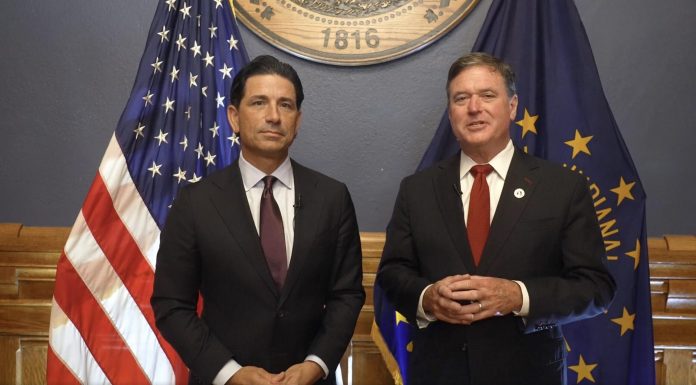Lawsuit accuses district of lawbreaking, but school board members pan it as ‘silly’ and ‘gratuitous.’
Indiana Attorney General Todd Rokita on Thursday filed suit against Indianapolis Public Schools — with help from a conservative think tank — accusing the state’s largest public school district of “thwarting” federal immigration enforcement.
State law blocks local government entities, including school districts, from limiting cooperation or interfering with U.S. Immigration and Customs Enforcement and other agencies.
“No public institution in Indiana has the right to pick and choose which laws to follow,” Rokita said in a news release. “When a school district refuses to cooperate with ICE, it doesn’t just break the law — it endangers students, protects criminal aliens, and sends a dangerous message to every government body in this state: that compliance is optional. Not on my watch.”
The lawsuit seeks an injunction preventing IPS from enforcing its policies.
In a Thursday evening statement, the IPS board of school commissioners affirmed the district’s commitment to “ensuring safe, supportive, and welcoming learning environments for all students.”
“As has always been the case, we will continue to uphold the law while keeping these commitments,” the board added, before knocking Rokita’s intentions.
“While IPS takes all legal obligations seriously, we respectfully hope that all concerned parties will recognize the heavy burden that silly litigation and political posturing places on students, families, and taxpayers,” the statement continued. “Every dollar spent on defensive legal posture is a dollar not spent on instructional support, teacher development, student services, or enrichment. In this case, Mr. Rokita prefers those dollars go to fight gratuitous political battles, as has too often been the case.”
Lawsuit’s claims
Rokita alleged IPS has “sanctuary” policies that bar employees from assisting immigration officers unless their cooperation is required by law and approved by the district’s superintendent.
IPS also prohibits employees from gathering, maintaining or sharing the immigration status of students, their families and district staff unless it’s legally required, Rokita asserted.
Finally, he accused the district of limiting ICE access to school facilities. Officers must have a warrant signed by a judge, or it must be an emergency, according to the lawsuit — and IPS legal counsel must authorize the access.
Rokita argued the district’ policies don’t let employees voluntarily comply — which he said violates state law — and that the limits are impermissibly stricter than federal law.
“Sanctuary policies are bad in any context, but they are especially troubling in our schools,” he said, in a news release. He claimed schools are “vulnerable to infiltration by criminal illegal aliens” and said that’s why “it’s essential that ICE be able to take action when that occurs to help keep our kids safe.”
The lawsuit described how IPS procedures tripped up one Honduran national’s planned self-deportation earlier this year. His son went to school on the day of the deportation flight.
“ICE faced significant obstacles — caused by IPS policies and actions on January 8 — in its efforts to reunite the father and the son,” the complaint reads.
The district asked ICE to produce a judicial order or demonstrate that it was an emergency, employees put the child in contact with an immigration attorney and legal counsel for both ICE and IPS went back and forth throughout the day.
The man missed his flight, and his voluntary deportation order expired later that day, according to the lawsuit. The child was released to the immigration attorney after the school day
That prompted a February letter and civil investigative demand from Rokita’s office to IPS about its policies. The district replied in April and made some changes in response, but the edits “did next to nothing to ameliorate the policies’ legal infirmities,” the lawsuit reads.
Rokita’s office sent a second letter on Oct. 3 about the findings of its investigation into IPS policies. The complaint accuses the district of failing to give substantive responses by an Oct. 17 deadline, or by an Oct. 28 extension. “Accordingly,” Rokita determined there’s probable cause the district has violated Indiana Code.
In its statement, IPS confirmed the district has been “actively collaborating” with the Office of Attorney General to review its policies and procedures. School board members said they needed more time to respond.
“Unfortunately, despite taking six months to craft his opinion on IPS’ policies, Mr. Rokita permitted only five business days from the time IPS received his review to respond, and then refused IPS’ request for any additional time,” they said. “Yet, these important issues deserve thoughtful, deliberative weighing of important legal rights — not impulsive, superficial efforts for political gain.”
Board members also criticized Rokita’s use of the term “aliens” for noncitizen children and their families, saying that he’s “willfully dehumanizing” them and instead calling students “invaluable, unique, and bright human beings.”

“In Indianapolis Public Schools, the safety and security of our students is our top priority, and this commitment is non-negotiable,” the board concluded.
The America First Policy Institute joined the case as special counsel.
“Attorney General Rokita is showing exactly the kind of leadership America needs,” said Leigh Ann O’Neill, the conservative think tank’s chief legal affairs officer. “When state attorneys general act boldly to enforce cooperation with federal immigration law, they help protect families, uphold the rule of law, and stop the political gamesmanship that endangers our communities.”
She said the institute is “proud to support this work” and is ready to help other attorneys general “looking to follow Indiana’s lead.”
The national nonprofit worked alongside the Attorney General’s office in developing the legal strategy. The institute sees the Indiana case as a model for other state leaders to hold “rogue” state government agencies accountable and restore lawful cooperation between local institutions and federal agencies.
Meanwhile, the state’s largest professional educators organization proclaimed that it “stands with” IPS.
The Indiana State Teachers Association “believes every child in Indiana, regardless of background or immigration status, has the right to a safe and welcoming public school,” the group said. “Educators have both a professional and moral responsibility to protect the wellbeing of their students and ensure schools remain places of learning, trust and stability.”
“ISTA stands with Indianapolis Public Schools and its educators who are working every day to uphold these values,” it continued. “Turning schools into extensions of immigration enforcement threatens that trust and undermines the learning environment every student deserves. Our focus must remain on educating and protecting students, not politicizing their safety.”





